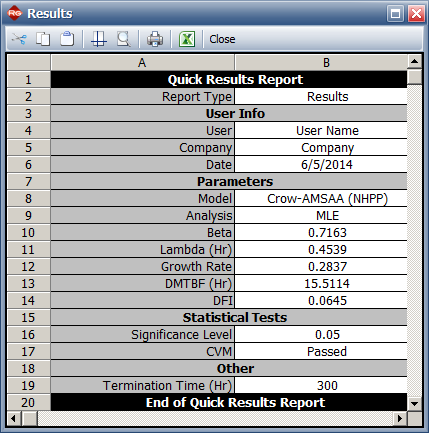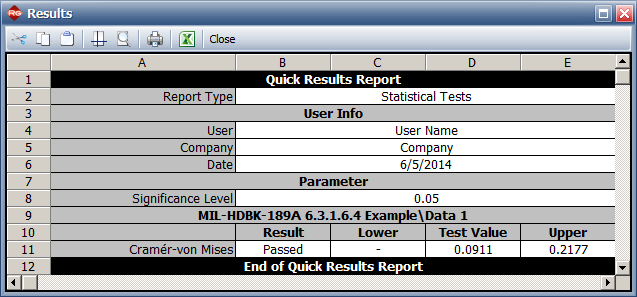Multiple Systems (Known Operating Times) Data Reference Example
This example validates the results for multiple systems (known operating times) data in Weibull++ Reliability Growth data folios.
Reference Case
MIL-HDBK-189A, Section 6.3.1.6.4, pg. 156, 2009.
For this example, the following will be calculated:
- Parameters of the Crow-AMSAA (NHPP) model
- Demonstrated MTBF (DMTBF)
- Cramér-von Mises (CVM) goodness-of-fit
Data
The following table shows the data.
| Prototype #1 | Prototype #2 | Cumulative Time |
|---|---|---|
| *2.6 | 0 | 2.6 |
| *16.5 | 0 | 16.5 |
| *16.5 | 0 | 16.5 |
| *17 | 0 | 17 |
| 20.5 | *0.9 | 21.4 |
| 25.3 | *3.8 | 29.1 |
| 28.7 | *4.6 | 33.3 |
| *41.8 | 14.7 | 56.5 |
| *45.5 | 17.6 | 63.1 |
| 48.6 | *22 | 70.6 |
| 49.6 | *23.4 | 73 |
| *51.4 | 26.3 | 77.7 |
| *58.2 | 35.7 | 93.9 |
| 59 | *36.5 | 95.5 |
| 60.5 | *37.6 | 98.1 |
| *61.9 | 39.1 | 101.1 |
| *76.6 | 55.4 | 132 |
| 81.1 | *61.1 | 142.2 |
| *84.1 | 63.6 | 147.7 |
| *84.7 | 64.3 | 149 |
| *94.6 | 72.6 | 167.2 |
| 104.8 | *85.9 | 190.7 |
| 105.9 | *87.1 | 193 |
| *108.8 | 89.9 | 198.7 |
| 132.4 | *119.5 | 251.9 |
| 132.4 | *150.1 | 282.5 |
| 132.4 | *153.7 | 286.1 |
Result
The book has the following results:
- Beta = 0.716, Lambda = 0.454
- DMTBF = 15.5 hours
- Using significance level = 0.05. CVM = 0.091. Critical value = 0.218. Since CVM < critical value can fail to reject hypothesis that model fits the data.
Results in Weibull++
In Weibull++, the Crow-AMSAA (NHPP) model with the maximum likelihood estimation (MLE) method was used to calculate the results.
- The model parameters are:
- The Cramér-von Mises (CVM) goodness-of-fit test results:


